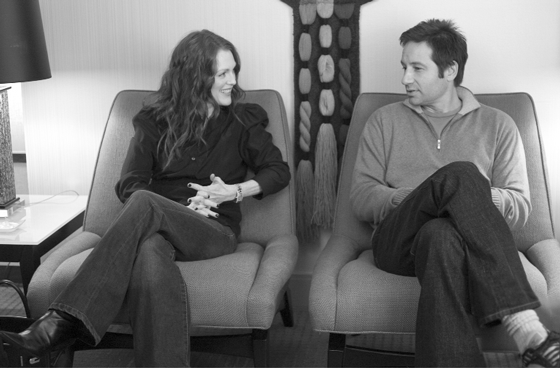By Jenny S. Halper
Moore.
Something you should know about Julianne Moore: she has a sense of humor. Yes, there’s evidence in “Evolution,” “Laws of Attraction,” and, if you rewind to her ingénue days in the mid-nineties, the Chris Columbus comedy “Nine Months,” in which the now-New Yorker played a pregnant ballet instructor trying to teach Hugh Grant about commitment.
But that was years ago, and after earning Oscar nominations for roles including an ill-fated Englishwoman (“The End of the Affair”) and a repressed housewife (“Far from Heaven”), it’s easy to see why she’s been silently crowned the queen of dramatic tragedies.
But early on a recent Saturday morning, Moore is surprisingly lighthearted — and alert enough to detect a faint whiff of cigarette smoke at the Ritz-Carlton hotel in Battery Park City, where she’s been invited to talk to the press. “Bart calls me the nose,” Moore laughs as she sits down, unsurprisingly radiant, famous red hair hanging long and loose.
The real reason for her laughter is “Trust the Man,” a romantic comedy written and directed by her husband, Bart Freundlich, who was well aware of Moore’s comedic side before he tapped it. They met when he cast her as Noah Wyle’s ice queen sister in his first feature, “The Myth of Fingerprints.” Two children, another movie (“World Traveler”), and one West Village townhouse later, Freundlich and Moore are again collaborating, this time in the city they call home.
A character-driven, slapstick comedy, “Trust the Man” follows two New York couples through the tribulations of romantic life. Elaine (Maggie Gyllenhaal) is an aspiring writer with a commitment-wary boyfriend, Tobey (Billy Crudup). Tobey’s sister, Rebecca (Moore), is a famous actress married to Tom (David Duchovny), a stay-at-home dad who attends sex addicts’ meetings after indulging in online pornography.
In one of the film’s funniest scenes, Tom finds Rebecca on her “last day of carbs,” choking on a giant piece of cake.
“That is autobiographical, yes indeed,” says Moore, explaining that Freundlich’s January birthday always precedes the Golden Globe Awards. She’s frequently nominated and “usually nervous,” and there’s always a giant cake in their fridge.
One year, she says, “I was waiting for him to get ready and I was breathing and eating at the same time. Bart came out and there I was, in an evening gown, in the kitchen, hunched over a coconut cake, choking. I said ‘you know, someday you should put this in a movie.’”
The similarities between “Trust the Man” and the couple’s life off screen start with shooting locations in the Village, which permitted Moore to walk to the set and bring her children on the days she wasn’t working. The film is filled with familiar people (her kids have cameos), familiar objects (Moore’s real-life retainer), and familiar places, including Downtown restaurants frequented by the Moore-Freundlich family. Melestra, Tarte, and Pastis are just a few.
“A lot of it had to do with the relationships we had with the [restaurant] owners,” Moore said. “The thing that appeals to me is how community-oriented the city is…this restaurant we go to, it was the first place my daughter went. They carried her into the kitchen when she was two weeks old.”
Other local locations include Tom and Rebecca’s townhouse on Bank and Washington Street, and an apartment on Bleeker and West 11th that moonlighted as the interior of Elaine and Tobey’s Upper West Side loft. Flower shops and newsstands were shot from Greenwich Street to Hudson, and a key scene between Duchovny and Crudup was filmed in Vaselka Coffee Shop.
Even the role of Rebecca resembles Moore, though it was originally intended for someone else. Re-reading the script in bed one night, Moore “finally piped up” and told Freundlich she’d regret it if she didn’t play the part of the actress, who has real-life concerns just like everyone else.
“You still have family obligations,” says Moore, who, according to her husband, has juggled being a mom, a wife, and a movie star with ease. “That’s what these people talk about…their marriages, their boyfriends, their children, their families. It’s all about these people and their relationships. It has a highly romantic view of how necessary they are.”
































